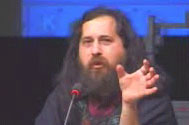 Discussion
-- Free Software and Beyond Discussion
-- Free Software and Beyond
moderated by Timothy
Druckrey
Richard Stallman: I tried contracting GNU and Linux to LIGNUX and a few people got insanely angry. They don't get that angry at GNU/Linux. I don't know why, but I'm happy either way. I'll do the one they get less angry at. Audience: Can you tell us about the current status of the GNU operating system, namely the Hurd? Stallman: NO! No, The GNU Hurd is our kernel project -- it is not an operating system, it is one piece of an operating system. The GNU Hurd when combined with the Mach micro kernel forms a piece of the system comparable to Linux. Both of them are kernels which is just one part of the larger operating system. As to the status of the Hurd, it runs, it is not mature, but we don't have somebody spending a lot of time on it. I'd love to have a very good hacker come and do some work on it. Because it has an advanced architecture that could provide advantages if people would come and take advantage of it. For example, you get an object oriented file system. It would be great if somebody came and did some work on it. And it needs a lot of work.
Stallman: I think I understand. The issues of free software have the greatest level of importance when we are talking about software of general interest, that is of interest to a large number of people. The issue is simply less important as an ethical issue, when only one or two companies are going to use it. When only one company is going to use it the issues disappears. For custom software -- and I should point out that 90 percent of software development as a business is custom software --, the issue is non-existent, because you develop it, you give it to this one company that paid for it, and they can do what they want with it. You could say it is free software, if they are getting all the rights to it, they could redistribute it. They have all the freedom. If you think that there are two companies that want it, you could sign contracts with both of them that say if they use your software, they will pay you a certain amount. It could be like a subscription, or like a small users' group where they pool funds to pay you for the development of the software. This is not normal today, but in a world where people are used to free software I think it could be made to work. I haven't done it, but it has a chance. Audience: But the difference to the situation we have now is that people just code something and say 'if the audience or the world uses it or not, that is not my problem -- I give them the chance to use it.' Stallman: Well, in fact, you would consider it your problem if they didn't use it, because you would go broke and you probably put a lot of time and effort into figuring out what kind of a market there is. In the case of a program that is useful only to a small number of organizations, that is not very different from what I'm suggesting. I'm not saying that it is guaranteed to be a viable method, but don't assert that it couldn't be viable either.
Stallman: Yes, it absolutely can. Software patents are devastating to anybody who wants to develop software. But it is not only devastating to free software developers. Even for developers of proprietary software, software patents are dangerous because they are like land mines. When you take one step in a minefield it is pretty safe, but if you have to go across the whole field, that is pretty dangerous because you have to take many steps, and each contains a certain amount of danger. That's the way it is with software patenting. People often think that patents cover a program. If that were the case it would not be so bad. What makes it really dangerous is that they patent an idea. For example, they may patent a feature, an algorithm, a technique. Well, when you are writing a large program you're going to use lots of algorithms and techniques, and implement lots of features. Each one of these is a step in the minefield. It might blow you up. The analogy with the minefield is only partial. Because the patent points in a certain direction. Well, the big companies get a lot of patents, and they point in all directions. No matter what you're doing, chances are that IBM has a patent pointing at you -- at least, if what you are doing has something to do with computers and software. If you are making an aeroplane, maybe IBM doesn't have any patents there, maybe on the computers and the software that fly the plane. This is one reason why patents tend to benefit large companies. It is unusual for a small company to make a product that doesn't use anything that the big companies have patents on. If you want to start a small company and make a product, and think that by patenting one aspect of it, that is going to 'protect' you -- that's the word they love to use, 'protect', I don't like that word, I try to avoid it -- you just have to wait until the big companies say: 'By making this product you are infringing all of these patents that we hold, so cross license with us.' And that way the big companies get to do the thing that you have patented. The result is that the big companies can do whatever they want. They rarely run into in trouble because they can get out of it by cross-licensing. But you as a small company only have a few patents. So you can't make everybody else cross-license with you. So when you step on the patents of some company that your five patents don't point at, they just attack you and take your money. Audience: Are there any plans for the Free Software Foundation to patent any software? Stallman: We have thought about it. The problem is that it is a hard thing to get patents. It costs a lot of money and it takes a lot of work. The reason I have thought about it is that maybe we could use them for cross-licensing. Suppose somebody has a patent covering some algorithm that we need to use. Then suppose that we get another patent that is pointed at that guy. We could say to him, we'll shoot our patent at you unless you make an aggreement that you stop pointing your patent at us. And that way we can get permission to use that algorithm so we can write free software with it. That would be the reason why it might be useful for us to get patents. But so far we haven't because it's too hard.
Stallman: No, I don't think it is applicable to software, and I'll tell you why. For software, it is essential in order to have a community that we have the freedom to publish improved versions of the program. There might be ten or a hundred people involved. The question becomes how do you decide who gets the money, or to put up the box saying 'Click here to send me 5 dollars', how do you decide who it should be send to? With music, because there is no great use in making a modified version of a piece, it's OK if that isn't permitted. And if only verbatim copying is permitted then it's very simple. The box that says 'send the dollar' will point to the person who made that recording. It will always point to that one person. There may have been several people who worked together on the music, but then they would agree on how to divide up the money. So you don't get this problem. For this reason I don't think this particular model works for software. Fortunately though, we see that the free software community does produce enough software. So that fear that if we don't put our heads in yokes we won't get enough software is gone. Some people are finding arrangements to make a living doing free software. Often it means that they are mostly selling services like support for the free software. Audience: How do you make a living? Stallman: I make most of my money by giving speeches. But a crucial part of it is living cheaply. [applause] I have to say that my resolve not to pick up expensive habits like houses, cars, boats, airplanes, paintings, children... [laughter] ... was absolutely essential to my ability to do the GNU project. However there a people making good money developing free software. For example, the guy who developed Ghostscript told me 'I just have to make 80,000$ a year, I just can't live without that.' Fortunately he manages to get it.
Stallman: I don't want to answer that question because it uses the term 'intellectual property' which is a bad term to use. Let me explain why. It is an attempt to make a generalization where you can't generalize correctly. To try to generalize about systems of law such as copyright, patents, trade secrets, trademarks, and other minor things that are vaguely similar is wrong because they are too different. If you pick one term to apply to all of them, that will lead you to treat them as if they were similar, to assume that they are similar. They are not similar, they are more different than they are similar. It leads to intellectual error to use any term to generalize about them all. You should not talk about them all, you should discuss them individually. Talk about copyrights, talk about patents, talk about patents in a specific field, because they have different effects in different fields. Because of that it's a pitfall for error. There's another problem with it. It presupposes an answer to the most important question about the political issue which is: should somebody be able to own a monopoly of controlling other peoples' use of some kind of conceptual abstraction. By calling these things property you're assuming that they are somebody's property. You are tossing out the other alternative that maybe they should not be somebody's property, maybe that form of power should not exist in society. Because of that I won't talk about intellectual property. The other things is, I don't think the identity of the owner matters at all. What matters is whether you are free or a slave -- it doesn't matter who the master is. Who it is that holds the other end of the chain is secondary. The important thing is if there is a chain on you. So forget the identity of the master. [applause]
Stallman: I don't know if I would agree with you on the rest of the problems in society and what should be done about them. I would say that the free software movement is having a considerable amount of success, so there is no reason to think that we cannot succeed just by talking about software, or more generally the things that you can have on your computer. In any case, the issue that I'm talking about is the issue of what freedom you have in using published works. And this issue does not transfer directly to anything else. There are other political and ethical issues effecting society, more important than this one. But they are different, not just generalizations of this issue to another area. It is not clear to me that there is any sense in linking these issues -- how could you when they are totally different? People who agree on this issue might disagree on some other issues. We have to work on them separately. I focus my efforts on free software. I support organizations such as Amnesty International, the American Civil Liberties Union, Zero Population Growth. Those are some of the other issues that I'm concerned about, but I don't think that they relate closely to this issue. There is one connection I can see which is the war on copying that is likely to lead to an increase in the abuse and the erosion of civil liberties as the owners of information pursue evermore Stalinist methods of trying to stop people from software samizdat. There was a magnificent movie called Brazil, which is about a tyranny in the future. It was a tiny part of the movie, but the justification for all of their tyranny was collecting the fees for the use of information. At the end of that movie, the copyright notice seemed to just BLAM out at me. I haven't had the chance to study carefully whether it was just that I noticed it or whether the director did something to call attention to it and urge people to compare that with what they had just seen.
Stallman: I'm not sure I can come up with brilliant visions every time I'm asked for one. Perhaps a mediocre one will do. The other thing is that I am not a graphic artist, I don't think visually, and have almost zero artistic aptitude. I have some knowledge about the economics of graphic art -- which is to some extent it is companies paying for it, that's commercial art. And to some extent it is a matter of people selling original paintings. And it is not clear to me that these issues relate to either of those. It's a mystery to me why people place so much value on the original, but as long as they do, I guess artists will be able to sell their original paintings. And having copies of their paintings on the Internet might increase their sales of their original paintings. And as long as companies want to advertise, there will be work for commercial artists. It is not really clear to me that there is any overlap between these issues. Audience: If a person who works for a firm that writes proprietary software, and wants to be a GNU, pure, moral coder, should he adopt the lifestyle that you have? Stallman: Well, either that or find another job. You might be able to find a job with a free software company. It is not the easiest thing in the world but it is not impossible. Audience: But isn't free software about liberation and freedom? If I want to be a pure GNU coder, shouldn't those firms.... Stallman: I don't understand the way your question is going. You seem to be takig the words I've said and applying them with a different meaning, and I don't know what the meaning is. Audience: Well, you don't like to tie economic production with your thoughts about freedom.
(Transcription
Diana McCarty)
|
 Audience:
First, I would like to pay you greatest respect for what you did and what
you started! [applause] I surely find your ideas and your philosophy wonderful,
but I have doubts that it only works for software for the mass market.
If I produce a software package which is very specific and only one or
two parties need it. And I have to spend some months or years to make it.
And I make it totally free....
Audience:
First, I would like to pay you greatest respect for what you did and what
you started! [applause] I surely find your ideas and your philosophy wonderful,
but I have doubts that it only works for software for the mass market.
If I produce a software package which is very specific and only one or
two parties need it. And I have to spend some months or years to make it.
And I make it totally free....
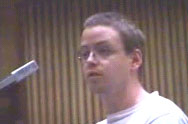 Audience:
We have heard about the patenting of genetic material by large companies.
Do you think that this could also happen to the software industry when
software patents were introduced in Europe?
Audience:
We have heard about the patenting of genetic material by large companies.
Do you think that this could also happen to the software industry when
software patents were introduced in Europe?
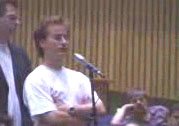 Audience:
You have described how musicians could make money with getting a dollar
off of a web site. Do you think that this model would apply to software
as well?
Audience:
You have described how musicians could make money with getting a dollar
off of a web site. Do you think that this model would apply to software
as well?
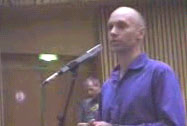 Audience:
I appreciated your attempt to draw a line from free software to free intellectual
development in the cultural field. The whole thing points back to the problem
of ownership, I think. And ownership has to do with the person who owns
something, because that's what he is and what he created. I was wondering
if there are any models for sharing the ownership of intellectual property?
Audience:
I appreciated your attempt to draw a line from free software to free intellectual
development in the cultural field. The whole thing points back to the problem
of ownership, I think. And ownership has to do with the person who owns
something, because that's what he is and what he created. I was wondering
if there are any models for sharing the ownership of intellectual property?
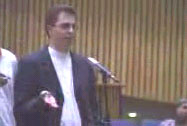 Audience:
The main problem seems to me that proprietary software is a much easier
way to make money quickly, and that society honors people higher who make
money than those who work for the public, at least in the press. We heard
a good example yesterday, the man from Intershop. He didn't understand
what we talked about. He mumbled during the discussion 'what's the world
these people live in?' He's a pure capitalist, but he's respected by the
press, he made 6 million. Do you think it is enough to discuss the problems
related to software and computers? I think it is a much larger social problem.
Audience:
The main problem seems to me that proprietary software is a much easier
way to make money quickly, and that society honors people higher who make
money than those who work for the public, at least in the press. We heard
a good example yesterday, the man from Intershop. He didn't understand
what we talked about. He mumbled during the discussion 'what's the world
these people live in?' He's a pure capitalist, but he's respected by the
press, he made 6 million. Do you think it is enough to discuss the problems
related to software and computers? I think it is a much larger social problem.
 Audience:
When I look at the free software movement, I see that we have a real new
model for programmers to earn a living and to distibute ideas, and keep
ideas free and the chance to have ideas open. I'd like to ask you, Richard,
for your vision on what the impact is on other areas of creative people,
for instance graphic artists?
Audience:
When I look at the free software movement, I see that we have a real new
model for programmers to earn a living and to distibute ideas, and keep
ideas free and the chance to have ideas open. I'd like to ask you, Richard,
for your vision on what the impact is on other areas of creative people,
for instance graphic artists?
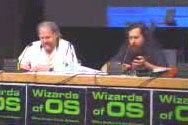 Stallman:
I relate them to each other, but they are not the same thing. There are
two ways that economics are relevant to free software. One is, to the extent
that people figure out ways to do free software businesses that enables
us to increase the amount of free software. So it contributes to our business
and also provides honest employment for programmers. So it's a good thing
when we find ways to do that. But the other way that it relates is when
the people who make proprietary software say 'let us have the power that
we want or you won't get software.' So of course, they are making an economic
argument. Fortunately we've proved that it's not true. It wasn't obvious
at the beginning. When we started the GNU project, I couldn't be certain
that that argument was false, we might have failed. But as it happens,
we now can just look around and see that that argument is false. So we
don't have to be that scared. Those are two possibly relevant connections
between free software and questions of economics. But free software is
not primarily an economic question. It is primarily a social and ethical
question, and thus, also a political question. Economics is relevant only
in so far as we how we can achieve the kind of society that we want to
live in.
Stallman:
I relate them to each other, but they are not the same thing. There are
two ways that economics are relevant to free software. One is, to the extent
that people figure out ways to do free software businesses that enables
us to increase the amount of free software. So it contributes to our business
and also provides honest employment for programmers. So it's a good thing
when we find ways to do that. But the other way that it relates is when
the people who make proprietary software say 'let us have the power that
we want or you won't get software.' So of course, they are making an economic
argument. Fortunately we've proved that it's not true. It wasn't obvious
at the beginning. When we started the GNU project, I couldn't be certain
that that argument was false, we might have failed. But as it happens,
we now can just look around and see that that argument is false. So we
don't have to be that scared. Those are two possibly relevant connections
between free software and questions of economics. But free software is
not primarily an economic question. It is primarily a social and ethical
question, and thus, also a political question. Economics is relevant only
in so far as we how we can achieve the kind of society that we want to
live in.